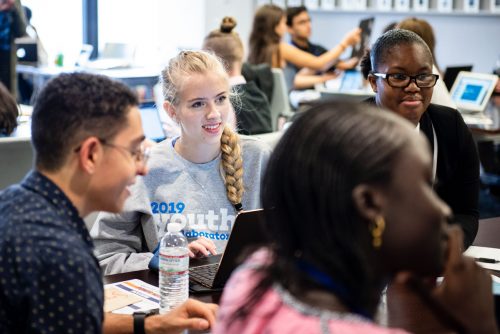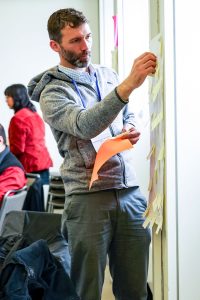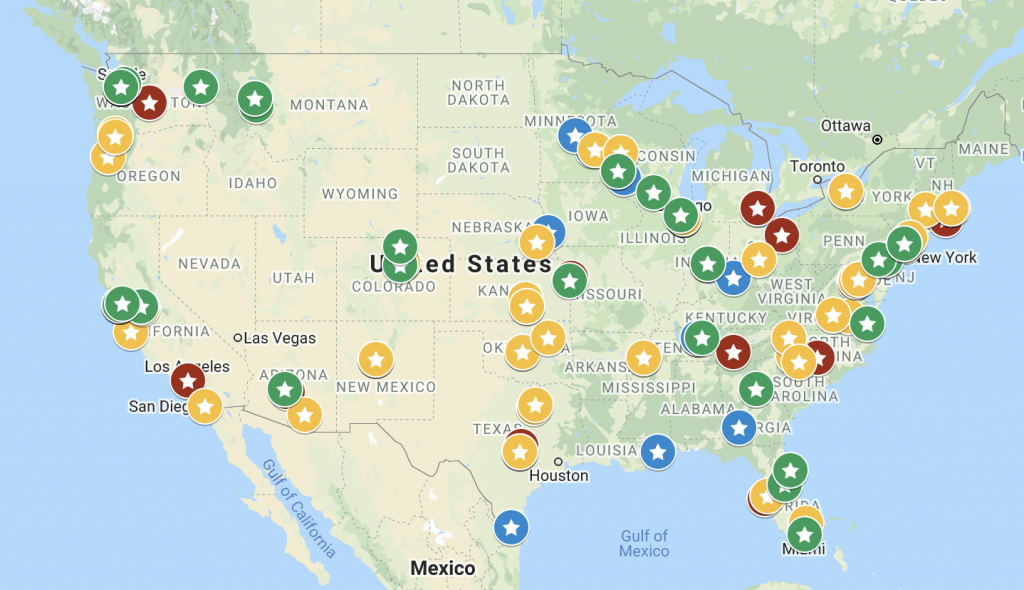Our Task
Countering a culture of hyper-individualism, cynicism, and powerlessness with one of powerful, responsible citizenship.

Our nation is facing a crisis of civic culture.
American life today is marked by hyper-individualism, rampant consumerism, a coarsening cynicism towards institutions and ideals, and distrust of all, by all. A zero-sum, scarcity mindset pervades our culture — a mindset of hoarding and fear that is contagious and self-perpetuating.
It’s not hard to see how this mindset manifests in our politics, our economy, and how we treat one another.
Fewer than 4 in 10 Americans feel that “most people can be trusted.”
Only 38% of Americans think it is possible to come together at this moment.
74% of Americans agree that “I feel like we can’t count on the people around as much as we used to.”
Read more about the state of trust in the US from this report from More in Common.
Yet even as frustration runs high, many people are hungry for belonging, connection, and meaning in civic life.

We want to change things but don’t know how or where to begin. We recognize that there should be another way for us to live and act together as Americans — one rooted in moral consciousness and a sense of common purpose, even amidst differences. But we haven’t seen this in our elected officials or found the right networks or ideas to help them a sense of civic purpose.
To counter a culture of hyper-individualism, cynicism, and powerlessness, we must instead build a different kind of culture — one of powerful, responsible citizenship.
Why culture?
We live in a time when attention is rightfully being paid to structural reform of laws and policy, on everything from racial justice to climate change. This work is vital. And yet structural reform, while necessary, is not sufficient on its own. We need to focus on culture — the narratives, norms, behaviors, values, and habits of the heart that add up to our collective sense of who we are — because culture must be changed if the changes in structure are to be enduring. It sets norms about whether we are meant to be creators of our future or mere spectators.
Culture matters because it defines the frame of the possible in policy and structural change.
A more vibrant and networked civic culture is what enables us to work together and ultimately solve our problems. Without opportunities to build trust and see each other’s shared humanity, we will be stuck in self-serving cycles. A strong civic culture — where we can connect and collaborate with others — is the work of this moment.

Our relationship with this idea of “America” will always be as solid or as tenuous as our relationships with each other. It can be built, but it takes practice.
Our goal

We believe a civic awakening is underway in the United States. And we are working to accelerate it. At the center of this vibrant civic culture we are seeking to build is a widespread understanding of citizenship, a belief that democracy matters, and a commitment to participate. We envision — and are helping to create — a vital, expanding ecosystem of groups, associations, and individuals committed to this ideal.
How we’re doing it
Here at Citizen University, we’re powering this culture shift by designing gatherings, rituals, and workshops that spark a more powerful sense of citizenship. We equip and support civic catalysts nationwide as they spread ideas and practices of powerful, responsible citizenship within their own communities.
The catalyzing effect
So here’s the good news: it’s working. We have worked with hundreds of catalysts (and counting) from around the nation who are sharing and adapting these ideas and ways of gathering with their home communities.

Part of a growing ecosystem
Our work of building culture is complemented and strengthened by our ecosystem. Groups like New Pluralists are addressing our nation’s crisis of division, distrust, dehumanization, and disconnection. Unfinished is imagining the future of technology, culture, and our economy to create a thriving multiracial democracy. Our Common Purpose provides a tangible roadmap for reinventing American democracy for the 21st century. Our work of building civic culture contributes to this ecosystem by reinforcing changes to structures, relationships, and ways of being.
We know that ultimately, our fervent hope for a strong democracy is to be in a game of continual, repeat play. For each generation to weigh, deliberate, refine solutions to address challenges of the time. And yet, that strong democracy must necessarily be one in which we each have access, we each participate. And we have yet to reach the true American promise of ensuring freedom, equality, and justice for all. And, closing this gap on the American promise — is indeed our most sacred role as citizens.

I felt like a boat in the ocean. I had a sail but I didn’t have a rudder; there wasn’t much I could do. You’ve given me the skills so that I can do things in my community.